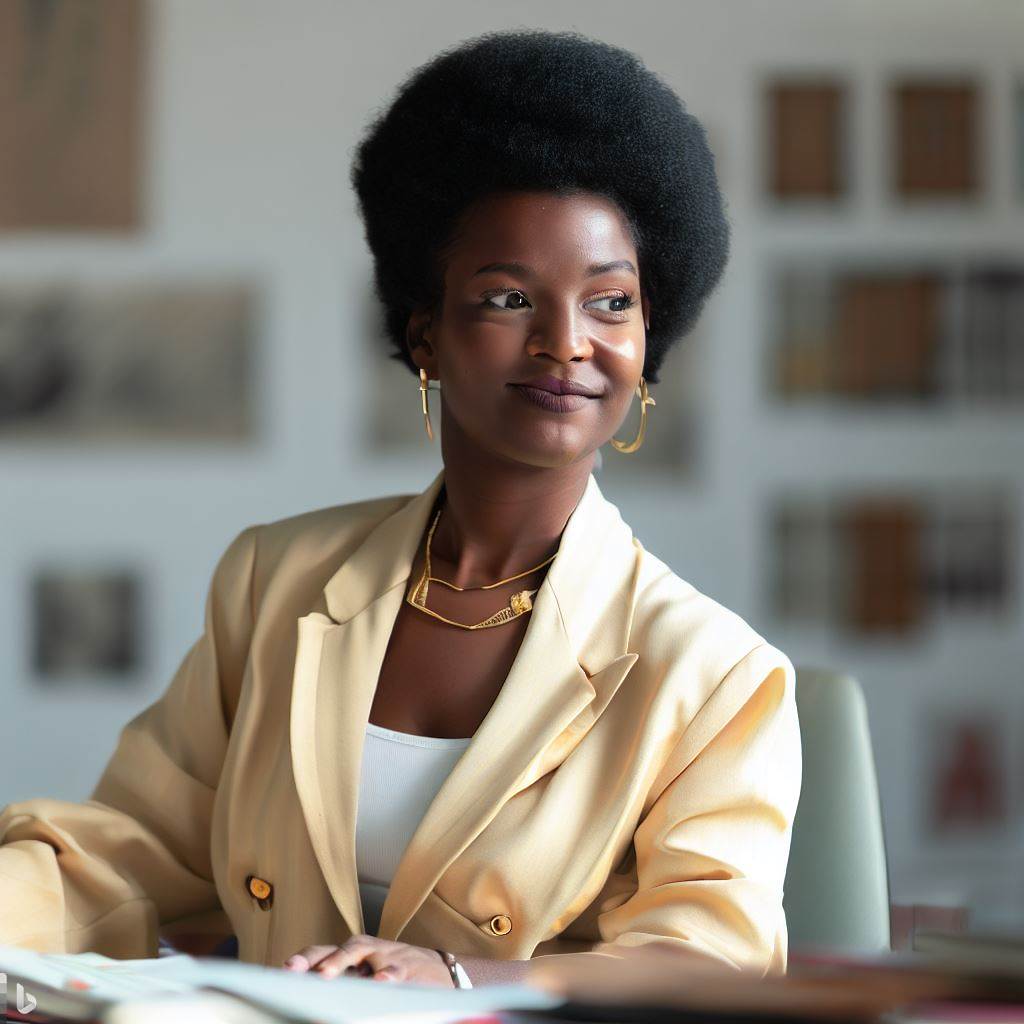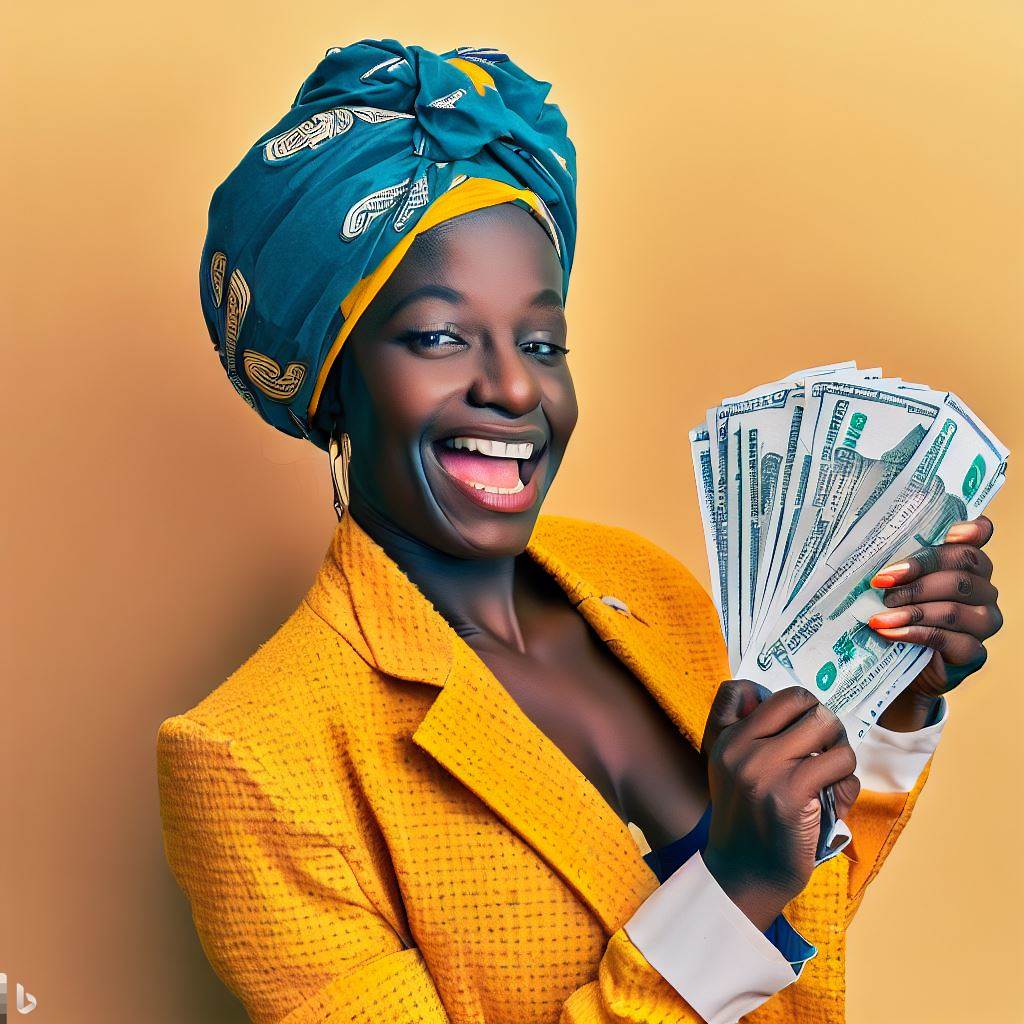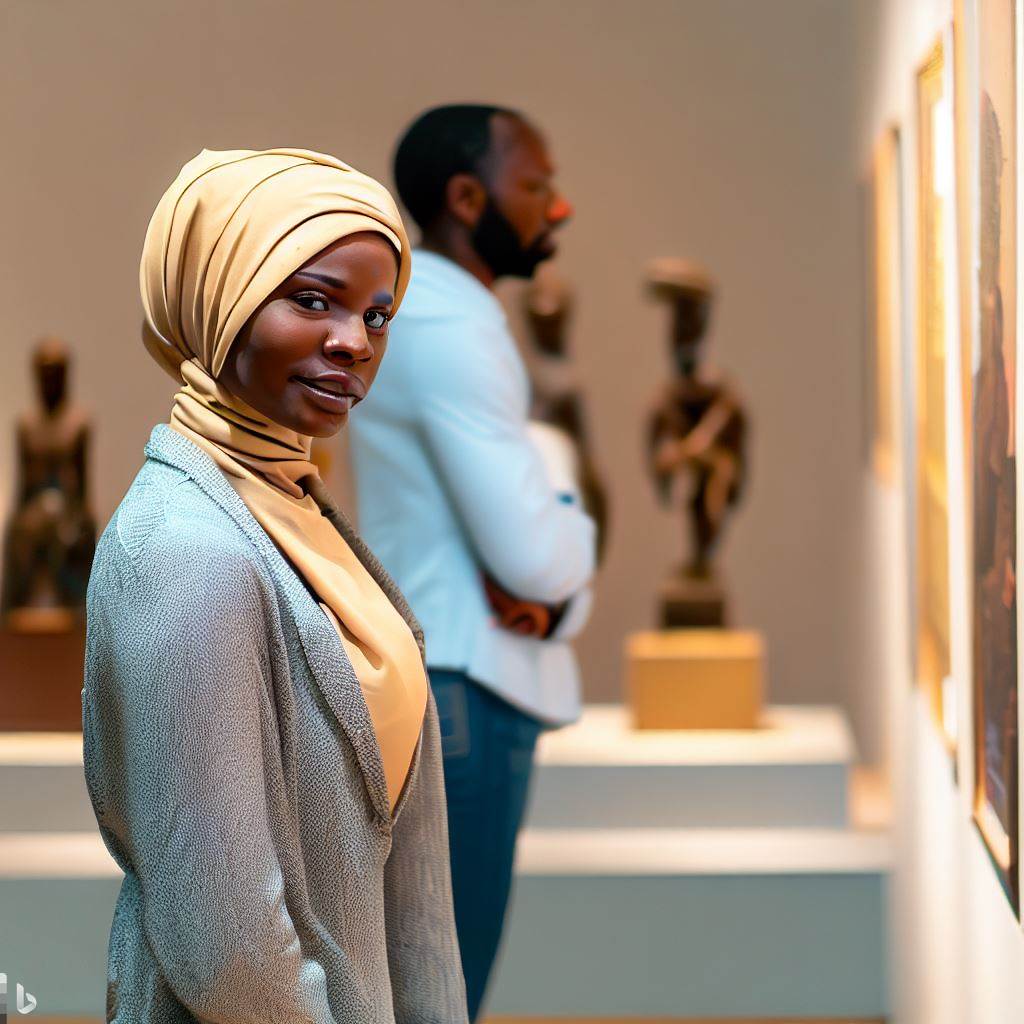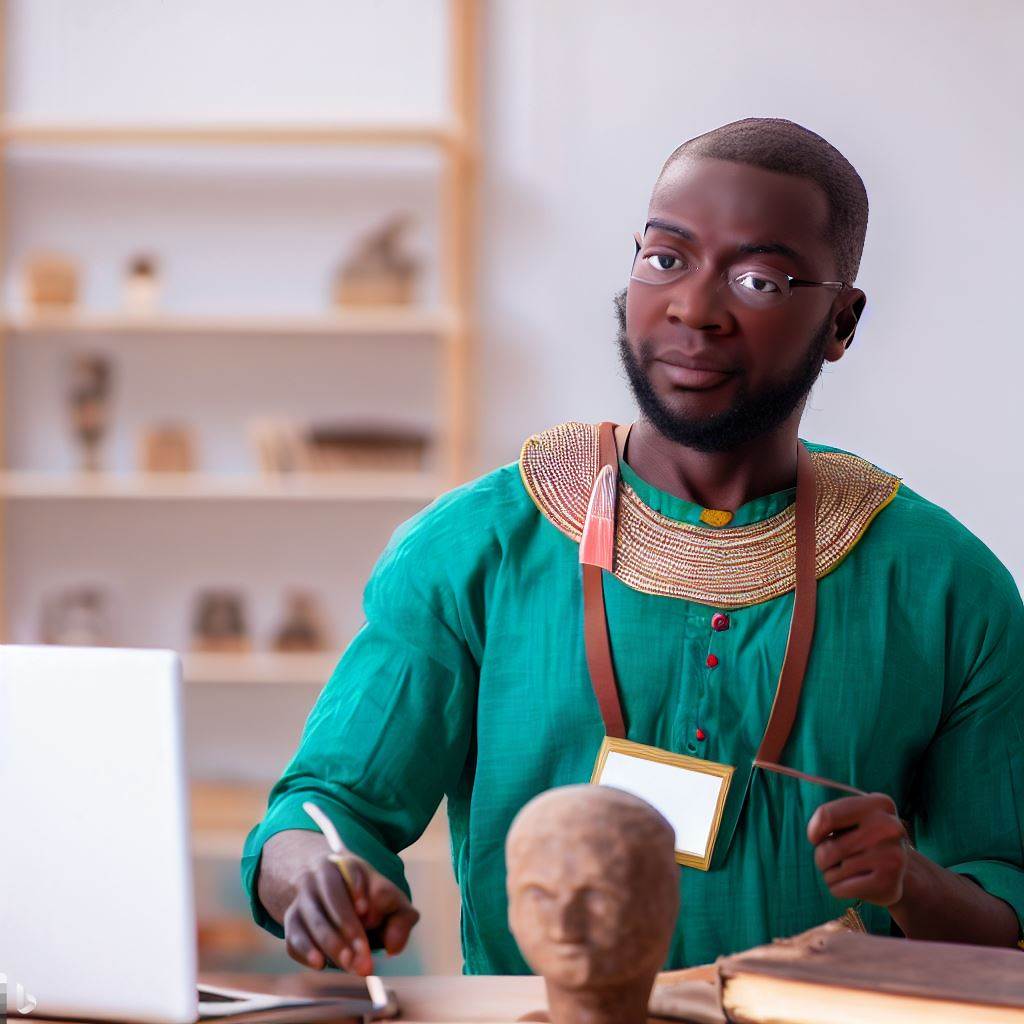Introduction
A curator, the guardian of culture, wields a unique power – shaping narratives, preserving heritage.
In this blog post, we delve into the intricacies of successful curatorship, drawing inspiration from Nigeria’s rich cultural tapestry.
We’ll uncover key traits, challenges, and success stories from Nigerian curators, shedding light on their remarkable journey.
Definition of a Curator
A. The role and responsibilities of a curator
- A curator is responsible for managing and preserving collections in museums, galleries, or cultural institutions.
- They research, select, and acquire artworks, artifacts, or historical items to enhance the collection.
- Curators organize exhibitions and displays, ensuring proper documentation, conservation, and storage of the objects.
- They also collaborate with other professionals, such as historians, artists, and educators, to create engaging and educational programs.
B. The importance of curators in various fields
- In art museums, curators interpret and showcase artworks, promoting cultural understanding and appreciation.
- In history museums, curators curate collections that preserve and share important historical events and narratives.
- In science museums, curators bridge the gap between scientific research and public understanding by curating scientific exhibits.
- Curators in botanical gardens play a crucial role in preserving plant species and educating visitors about conservation.
C. The relevance of curators in the Nigerian context
- Nigeria’s rich cultural heritage requires skilled curators to safeguard and promote its diversity.
- Curators play a vital role in preserving and showcasing Nigerian artworks, traditional crafts, and historical artifacts.
- They help document and interpret Nigeria’s cultural practices, traditions, and stories for future generations.
- Curators in Nigeria contribute to a sense of national pride, as their work encourages appreciation and understanding of local culture.
By employing passionate and knowledgeable curators, Nigeria can preserve and showcase its rich cultural legacy for generations to come.
Read: The Evolution of Curatorial Practices in Nigeria
Qualities of a Successful Curator
A. In-depth knowledge and expertise in the subject matter
- Curators like Kunle Adeyemi and Ugochukwu-Smooth C. Nzewi possess specialized knowledge in Nigeria.
- Expertise contributes to successful curation by ensuring accurate representation and contextual understanding.
B. Strong research and analytical skills
- Research is vital in curating exhibitions, collections, or content to provide accurate and meaningful information.
- Nigerian curators like Bisi Silva and Azu Nwagbogu excel in research and analysis, enhancing their curation outcomes.
C. Excellent communication and storytelling ability
- Curators engage and educate audiences through compelling narratives that connect with their interests.
- Nigerian curators like Nike Adeyemi and Efe Obanor possess exceptional storytelling skills, captivating and enlightening visitors.
D. Creativity and innovation
- Nigerian curators push boundaries and challenge conventions by experimenting with new ideas.
- Innovative exhibitions or projects by curators like Amarachi Okafor and Seun Kuti showcase creativity in Nigerian curatorship.
E. Collaboration and networking
- Curators need to build relationships with artists, institutions, and the community to foster collaborative opportunities.
- Successful collaborations in Nigerian curatorship can be seen in projects involving curators such as Jelili Atiku and Bisi Adeleye-Fayemi.
These qualities contribute to the success of curators in Nigeria, enabling them to curate impactful and thought-provoking exhibitions, collections, and content.
Read: How to Get Your First Curator Job in Nigeria

Uncover the Details: Beauty Therapist Licensing in Nigeria: What You Need to Know
Challenges Faced by Curators in Nigeria
A. Limited resources and funding
Curators in Nigeria encounter various challenges in their work, with limited resources and funding being one of the major obstacles.
The financial constraints often faced by Nigerian curators make it difficult for them to fully realize their curatorial visions and projects.
However, despite the challenges, curators have come up with creative solutions to overcome funding limitations.
Crowdfunding has emerged as a popular method employed by Nigerian curators to secure financial support for their exhibitions and events.
By leveraging social media platforms and online fundraising platforms, curators can connect directly with individuals or organizations interested in supporting the arts.
This alternative funding method allows curators to gather the necessary resources to bring their artistic visions to life.
Additionally, partnerships with private businesses and organizations play a crucial role in securing financial support for curatorial projects.
By collaborating with sponsors or investors, curators are able to tap into additional funding sources and gain access to resources that may have otherwise been unavailable to them.
These partnerships foster a mutually beneficial relationship where curators can bring unique cultural experiences to the public, while sponsors receive exposure and recognition through their association with the arts.
B. Lack of infrastructure and institutional support
Another significant challenge faced by curators in Nigeria is the lack of adequate infrastructure and institutional support.
Inadequate facilities can hinder the proper conservation and display of artworks, limiting curators’ ability to create engaging exhibitions.
Additionally, the lack of institutional support in the form of proper funding and recognition hampers the growth and development of curatorial practices in Nigeria.
To address this issue, curators have taken proactive measures to establish better institutional support.
This includes advocating for increased government funding for the arts and organizing collective efforts to improve exhibition spaces and facilities.
By highlighting the importance of investing in cultural infrastructure, curators aim to create an enabling environment where artistic expression can flourish.
C. Cultural and political barriers
These two barriers pose significant challenges for curators in Nigeria.
Cultural restrictions may limit the type of art that can be exhibited or the subjects that can be explored.
Political restrictions can result in censorship or limitations on freedom of expression.
Despite these challenges, Nigerian curators have shown resilience and resourcefulness in navigating these barriers.
By utilizing innovative programming and collaborations, curators have found ways to address cultural and political sensitivities while still delivering thought-provoking and impactful exhibitions.
This includes engaging with local communities and involving them in the curatorial process to ensure cultural relevance and inclusivity.
Through their creative approaches, curators have successfully embraced and celebrated the diversity of Nigerian arts and culture, breaking down cultural and political barriers along the way.
Basically, curators in Nigeria face numerous challenges that impact their ability to curate successful exhibitions.
Limited resources and funding, lack of infrastructure and institutional support, as well as cultural and political barriers all contribute to the obstacles they encounter.
However, through innovative solutions, collaborations, and advocacy, Nigerian curators are striving to overcome these challenges and create a thriving and inclusive art scene in the country.
Read: Freelance Curating in Nigeria: Tips and Insights
Case studies of successful Nigerian curators
A. Examples of notable curators in Nigeria
- Bisi Silva: Silva is a renowned curator who founded the Centre for Contemporary Art in Lagos.
- Okwui Enwezor: Enwezor was a prominent curator known for his groundbreaking exhibitions worldwide.
1. Their achievements and contributions to the field
Bisi Silva’s achievements include organizing exhibitions that featured contemporary African artists and fostering dialogue on African art.
She also curated the 10th Dakar Biennale in Senegal in 2012.
Silva’s contributions include creating platforms for African artists to showcase their work globally and challenging the dominant narratives surrounding African art.
Okwui Enwezor gained recognition through his curation of the groundbreaking exhibition “The Short Century: Independence and Liberation Movements in Africa.”
He also curated the 56th Venice Biennale in 2015. Enwezor’s contributions include bringing African art to international audiences and advocating for a broader representation of artists from the Global South.
2. How they embody the qualities of a successful curator
Both Silva and Enwezor embody several qualities of a successful curator.
They possess deep knowledge and understanding of contemporary African art, which allows them to curate exhibitions that challenge existing narratives and explore new perspectives.
They demonstrate a commitment to promoting African artists and creating platforms for their voices to be heard on a global scale.
Their ability to engage with diverse audiences, foster dialogue, and bridge cultural gaps through their exhibitions showcases their talent for curating thoughtful and impactful shows.
Silva and Enwezor also display strong leadership skills, as they have successfully founded and directed art institutions that have become important cultural hubs.
By curating exhibitions that showcase the work of both emerging and established artists, they contribute to the growth and development of the art scene in Nigeria and beyond.
Moreover, they have established meaningful collaborations with artists, institutions, and collectors, which further strengthens their influence in the art world.
Their ability to navigate complex networks and build strong relationships enables them to curate exhibitions that resonate with audiences and have a lasting impact.
Generally, Bisi Silva and Okwui Enwezor are notable examples of successful Nigerian curators.
Through their achievements, contributions, and embodiment of the qualities essential to successful curation, they have made significant contributions to the field and have elevated the status of African art on the global stage.
Read: The Influence of International Curators in Nigeria
Conclusion
A. Recap the main ideas discussed in the blog post
Throughout this blog post, we explored the qualities and skills that make a successful curator in Nigeria.
We discussed the importance of passion, knowledge, and adaptability in curating cultural artifacts.
Additionally, we emphasized the significance of effective communication and leadership skills for curators.
B. Significance of curators in cultural preservation and promotion
Curators play a vital role in preserving and promoting Nigeria’s rich cultural heritage.
They are responsible for curating and managing collections, ensuring their preservation for future generations.
Moreover, curators facilitate cultural exchange and education by organizing exhibitions and engaging with the public.
C. Positive outlook on the future of curatorship in Nigeria
Looking ahead, the future of curatorship in Nigeria is promising.
With a growing appreciation for cultural heritage and the increasing recognition of the cultural sector’s economic potential, the demand for skilled curators will rise.
This presents exciting opportunities for aspiring curators to contribute to Nigeria’s cultural landscape and make a meaningful impact.




